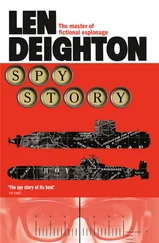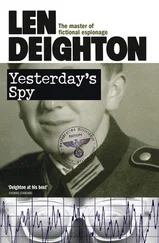Len Deighton - Spy Sinker
Здесь есть возможность читать онлайн «Len Deighton - Spy Sinker» — ознакомительный отрывок электронной книги совершенно бесплатно, а после прочтения отрывка купить полную версию. В некоторых случаях можно слушать аудио, скачать через торрент в формате fb2 и присутствует краткое содержание. Жанр: Триллер, на английском языке. Описание произведения, (предисловие) а так же отзывы посетителей доступны на портале библиотеки ЛибКат.
- Название:Spy Sinker
- Автор:
- Жанр:
- Год:неизвестен
- ISBN:нет данных
- Рейтинг книги:4 / 5. Голосов: 1
-
Избранное:Добавить в избранное
- Отзывы:
-
Ваша оценка:
- 80
- 1
- 2
- 3
- 4
- 5
Spy Sinker: краткое содержание, описание и аннотация
Предлагаем к чтению аннотацию, описание, краткое содержание или предисловие (зависит от того, что написал сам автор книги «Spy Sinker»). Если вы не нашли необходимую информацию о книге — напишите в комментариях, мы постараемся отыскать её.
Spy Sinker — читать онлайн ознакомительный отрывок
Ниже представлен текст книги, разбитый по страницам. Система сохранения места последней прочитанной страницы, позволяет с удобством читать онлайн бесплатно книгу «Spy Sinker», без необходимости каждый раз заново искать на чём Вы остановились. Поставьте закладку, и сможете в любой момент перейти на страницу, на которой закончили чтение.
Интервал:
Закладка:
Her office in the KGB/Stasi operational command building was light, and it had a new sheepskin rug and a pinewood desk, imported from Finland. These were considered status symbols. More important, they'd assigned to her a fifty-year-old male secretary named Hubert Renn, who spoke fluent Russian, some French, a little English and could take shorthand. Renn was a hard-line communist of a kind which only Berlin produced, and which was now almost extinct. He was the son of a stone mason, and together with his fifteen brothers and sisters had grown up in a dark three-room tenement in a cobbled alley in Wedding. During the nineteen twenties das rote Wedding was so solidly communist that the block was run on communal lines by appointed Party officials. Renn's mother had been a member of the ISK – Internationaler Sozialistischer Kampfbund – a political sect so strict that its members rejected alcohol, tobacco and meat. She left the ISK upon marriage, since only full-time workers were permitted membership.
Short, agile, undernourished and eternally combative in spirit, Renn was also efficient. It was typical of his frugality and practicality that when he turned back the lapel of his jacket he revealed a selection of pins, safety-pins and even a needle.
When Fiona first came face to face with her newly appointed secretary she thought that they'd met before. This mistaken familiarity came from her memories of people depicted in old photos of Berlin streets. Despite this feeling she was to discover that Renn was like no other person she'd ever met. With his thick neck, truculent ruddy face, neglected teeth and the short hair that responded to neither brush nor comb, here was a character straight out of Brecht.
Little Hubert Renn had been exposed to Leninism and Marxism while in the dented tin bath that doubled as a cradle. Essentially militant, the ISK rejected Marx's theory about the inevitable collapse of capitalism. The necessity of violent struggle was something he had heard his mother and father endlessly debating. After such an upbringing no one could teach Renn anything about the phraseology of left-wing politics. Even Pavel Moskvin, a Moscow-backed bully with whom Fiona had that morning crossed swords, could not best him in political argument. But Renn didn't mince words about 'the German road to socialism' or spend much time discussing why, at the vital Parteitag in April 1946, the party's declared aspirations had been based upon Marx and Engels and not Lenin and Stalin. Renn – who had been present at that historic congress – preferred to ask, somewhat archly, why it had taken place in the Admiralspalast theatre, noted otherwise for 'top comedy routines'.
My father was an anarchist, he told Fiona once when they were discussing some of the heresies, and that was the key to Renn's character, for Renn too was an anarchist in his soul. Fiona wondered if he realized it; perhaps he simply didn't give a damn any more. Some who'd waited too long for the millennium became like that. Renn's description of Pavel Moskvin – a 'Moscow-backed bully' – was freely offered to Fiona that morning before she'd met the man. And Renn was just as ready to be outspoken about everyone else in the building.
For the first couple of weeks Fiona had suspected that this outlandish old fellow had been put into her office as some sort of agent provocateur, or because no one else in the building would put up with such an oddball, but it didn't take her long to understand that in the DDR the bureaucratic process didn't work like that. It wasn't so easy, for even the most senior staff, to arrange to get the secretary that they wanted, and old Renn would not be an agent provocateur easy to run. The truth was that staff were assigned according to a rota in the personnel office. Her grade was eligible for a clerk of Renn's seniority and his previous boss had retired the week before she arrived.
Fiona and her secretary had spent all of Wednesday in a small conference centre in Köpenick Altstadt, in the wooded outskirts of Berlin. She had witnessed lengthy and sometimes acrimonious exchanges between her colleagues. There had been senior security men from Poland, Czechoslovakia and Hungary meeting to discuss the still somewhat muddled and disorganized political reform groups, and religious groups, in the East Bloc. Agreeing upon a concerted policy of dealing with them was not so easy. Fiona was pleased at the material she was gathering. It was exactly the sort of intelligence that Bret Rensselaer was so keen on, and the anxiety the communist security men had revealed at this meeting in every way supported Bret's projections. When contact was eventually established with London she would have a policy formulated.
She was going through the meeting in her mind while they waited for the car that would take them back to the Mitte. The others had been collected by a bus from the transport pool but Fiona was entitled to her own car. Cars, more than any other perquisite or privilege, were a sign of status, and establishing status was all-important in the DDR. So they waited.
Fiona walked down to the river, admiring the cobbled streets and the crooked old buildings. Surrounded with trees, Köpenick's church and Rathaus huddled upon a tiny island at a place where the River Spree divided. On the adjacent island – Schlossinsel – there was a richly decorated seventeenth-century palace. In its magnificent Wappensaal Frederick the Great had stood trial for desertion. From where they were standing it was possible to raise a loud cheer for the dilatory rate at which East Berlin was being rebuilt. From this view it was easy to visualize Köpenick on the day that renowned bogus captain marched in to discover how devoutly the Germans revere a military uniform, no matter who wears it.
She had hoped that the fresh air would help rid her of her headache: she'd been having too many of these racking headaches lately. It was stress, of course, but that didn't make the pain any easier to endure.
'Herr Renn,' said Fiona: she never called him by his first name.
Renn had been looking at the traffic crossing the bridge. Soon the East would be clogged with cars just as the West already was. He looked at her. 'Did I forget something, Frau Direktor?'
'No. You never forget anything. You are the most efficient clerk in the building.'
He nodded. What she said was right and he acknowledged the truth of it.
'Do you trust me, Herr Renn?' It was a deliberate way of shocking him.
'I don't understand, Frau Direktor.' He glanced round but there was no one else standing along the riverfront: just workers and shoppers going home.
'I never get the minutes of the morning meetings until late in the afternoon of the following day. Is there a reason for that?'
'Everyone receives the minutes by the same delivery.' He gave a sly smile. 'We are slow; that is the only reason.' A large air-conditioned bus came crawling over the bridge. Pale Japanese faces pressed against its grey smoked glass. From inside it came the shrill commentary of the tour guide of which only the words 'Hauptmanns von Köpenick' could be easily distinguished. The bus moved slowly on and was lost behind the trees. 'They never go and see the Schloss or the Art Museum,' said Renn sadly. 'They just want to see the town hall. The tour guide will tell them about the bootmaker who bought an army captain's uniform from a pawn shop, assumed command of some off-duty grenadiers and arrested the mayor and the city treasurer. Then they will all laugh and say what fools we Germans are.'
'Yes,' said Fiona. Despite the Schloss and the dark green woodland and the clear blue lakes and the rivers, the only thing anyone ever remembered about Köpenick was its captain.
'The sad thing is,' said Renn, 'that poor old Wilhelm Voigt, the bootmaker, didn't want the city funds; he wanted a residence permit, and Köpenick had no department authorized to issue one. He wasn't a Berliner, you see, and his escapade was a fiasco.'
Читать дальшеИнтервал:
Закладка:
Похожие книги на «Spy Sinker»
Представляем Вашему вниманию похожие книги на «Spy Sinker» списком для выбора. Мы отобрали схожую по названию и смыслу литературу в надежде предоставить читателям больше вариантов отыскать новые, интересные, ещё непрочитанные произведения.
Обсуждение, отзывы о книге «Spy Sinker» и просто собственные мнения читателей. Оставьте ваши комментарии, напишите, что Вы думаете о произведении, его смысле или главных героях. Укажите что конкретно понравилось, а что нет, и почему Вы так считаете.












